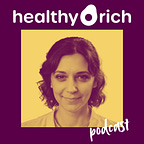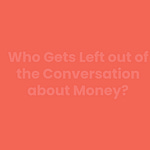Listen to this week’s podcast episode above or follow along with the essay below.
I recently watched the Netflix documentary Get Smart With Money, where four people connect with personal finance mentors for a year to tackle some money issues that have been stressing them out. It’s entertaining in a voyeuristic way to watch a person’s money journey, and it’s fascinating as a finance nerd to hear the questions people ask and see the advice experts offer.
But in these very personal conversations around money, there was one question I kept not hearing: Why?
As mentees bared their stories for mentors and the cameras, I kept waiting to hear the conversation go down this road. Why did you make that spending decision? Why does this feel so difficult for you? Why did you end up in these circumstances? But it never got there.
Healthy Rich is a platform for inclusive, budget-free financial education. Become a free or paid subscriber to support our work.
In one conversation between author and financial expert Tiffany Aliche (The Budgetnista) and her mentee, a New Jersey mom named Ariana who was working to pay off $45,000 in credit card debt, Tiffany asked, “What is going on your credit card?”
Ariana started to explain, “I’ve been doing a lot of Whole Foods deliveries, because getting to the—”
And her mentor cut her off to sum up the budget line item: “So, food shopping.”
I don’t know what Ariana was going to say, but it sounded like she might have been about to explain why she was spending extra on food shopping — a note that could offer a valid reason it would need to spill onto her credit card instead of coming out of her spending account.
This is only one small detail, and I’m not piling on Tiffany Aliche’s financial advice in general. She offered mentorship with kindness and care in the documentary, and it’s completely possible deeper discussions were edited out of the final cut.
But this is an example of how easily, in our culture, we skim over these opportunities for deeper discussions about our relationship with money and skip straight to the numbers.
Ariana’s numbers show $45,000 in credit card debt, debt payoff bills that consume half of her monthly income, working a second job while her husband works overtime and pays the household bills, living in a house that’s too small for their family and constantly fearing her car will break down.
The documentary only briefly details the origin of Ariana’s credit card debt, which brings up some gigantic whys for me.
“I got my first job out of college, and I wound up getting an apartment in New York that I couldn’t afford, with no savings, and it went from there,” Ariana explained. “Brunch was easily, like, $100 every weekend. My friends were going out, and they were always buying new clothes… And then we had kids, and then Amazon and Target became things.”
There are so many opportunities to stop here and ask why, to investigate this experience, to understand how Ariana’s circumstances called for credit card use even when it felt out of hand.
There are the whys we should ask her in particular: Why did you feel like you had to keep up with your friends’ spending? Why were you drawn to New York City for work? Why did you have kids when you did?
And there are the larger whys we need to be asking about the circumstances she was in: Why can’t someone with a full-time job in New York City afford to live in that city? Why are women held to such high social and beauty standards? Why does it cost parents so much to raise kids in our culture?
There’s so much why behind our money moves that tells a much richer story of our relationships with money than a budgeting spreadsheet can ever do. Moving straight toward strategies to spend less ignores the valid reasons someone is spending as they are.
Budget culture beliefs push financial mentors, coaches, counselors and advisors to ignore the whys and focus on molding people into the frugal, debt-free versions of themselves we imagine to be correct. If we continue to frame financial guidance this way — if we continue to fail to address the whole person behind a financial decision — we’ll continue to build a culture of financial education designed to keep people small so they fit into our chosen boxes, rather than one that builds people up to a place where money truly doesn’t run their lives.
Financial educators, coaches and advisors — How do you get to clients’ why when you’re talking about money? Ask them! Grab a free copy of my guide to Storytelling in Financial Education to learn how to have broader conversations about money with your clients.
A few things you can do next…
🎙️ LISTEN
Financial Coaching: What It’s Like to Work With a Money Coach
I enjoyed this episode of the Queer Money podcast, where the hosts chat with Hannah and Juliette, a couple who got financial coaching through the PBS show Opportunity Knock$. The episode raised a lot of the same why questions for me as the Netflix documentary and is a quicker and easier way to get a peek into financial coaching than watching a full movie or TV series.
📚 READ
Why I’m Fine with Failing a No Spend Month
This account from Penny at She Picks Up Pennies is a perfect look at why arbitrary spending restrictions are ridiculous, unhealthy and unsustainable. And she says this about budgeting, which I adore: “Obsessing over every penny in a document — no matter how aesthetically pleasing — feels like if Diet Culture and Scarcity Mindset had a baby … Restriction that’s hard to sustain with a whole lot of shame mixed in.”
⚒️ USE
Grab this worksheet to reflect on your relationship with money and uncover the whys behind your own financial decisions.
💪 DO
Next time you hear someone judging themselves for a money move — positively or negatively — expand the conversation by asking why. Make space for them to explore the why behind their decisions.
💡 REFLECT
Think about a recent way you used money — a point-of-sale purchase, an automated bill payment, a contribution to a savings account, whatever comes to mind. When and where was it, and how did this money move relate to what else was happening in your life at the time? What did the money contribute to or take away from your experience? Who was involved, and who was or will be impacted? Why did you make that move, at that time, in that way?
Image from the Netflix documentary Get Smart with Money








